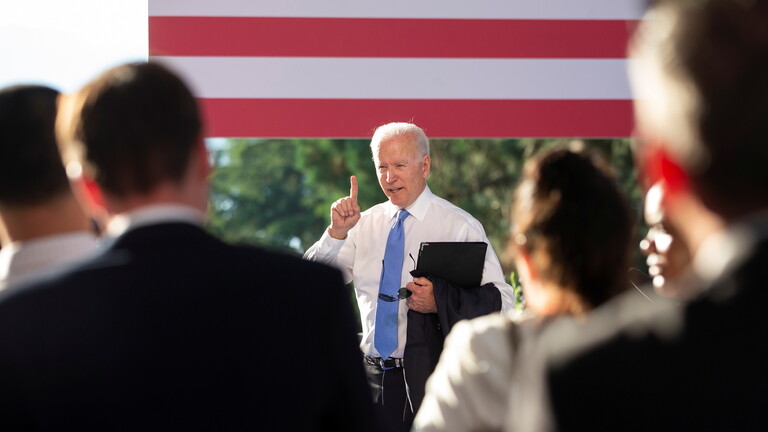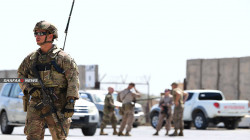In launching airstrikes in Syria and Iraq, Biden lowers bar for use of military force

Shafaq News/ President Biden’s decision Sunday to launch airstrikes against Iranian-backed “militias” in Iraq and Syria demonstrated how the administration plans to handle attacks on American troops and facilities in the region: The U.S. will respond forcefully even if no American personnel are killed or injured, a lower bar for retaliation than was employed by the Trump administration, U.S. officials said.
“We have a responsibility to demonstrate that attacking Americans carries consequences, and that is true whether or not those attacks inflict casualties,” said a senior administration official, who like others spoke on the condition of anonymity to discuss sensitive policy matters. “If you attack us, we are going to respond.”
That message, which has been relayed to Iran through diplomatic channels, represents a shift in policy from the Trump era.
Under President Donald Trump, who hoped to withdraw U.S. forces from the Middle East, Washington set a different red line: The killing of U.S. personnel would trigger a U.S. military response. Senior officials in the Biden administration believe that policy did little to deter the wave of nonlethal rocket attacks on U.S. facilities in Iraq that increased dramatically in 2019 and 2020 after the Trump administration withdrew from the Iran nuclear deal and began imposing numerous sanctions on Tehran’s economy.
The new policy, designed to deter lethal and nonlethal attacks, raises questions about what will stop tit-for-tat strikes from spiraling out of control and how such skirmishes advance the Biden administration’s ultimate goal of drawing down U.S. forces in the Middle East.
The three U.S. strikes carried out by Air Force planes on Sunday targeted weapons storage facilities used by the “militia” groups Kataib Hezbollah and Kataib Sayyid al-Shuhada, according to the Pentagon. The militants retaliated on Monday with rocket attacks on U.S. troops, but they did not result in death or injury.
Since April, the “militias” have carried out five drone attacks on U.S. facilities, including on a CIA hangar in the northern city of Irbil in the spring. The attacks demonstrated a growing technological sophistication that alarmed the White House and prompted a series of interagency discussions about the appropriate U.S. response that culminated in last weekend’s strikes, said U.S. officials familiar with the matter.
Since the spring, Biden has been briefed on the attacks by his top intelligence officials’ multiple times in his morning presidential daily briefing, said a person familiar with the matter.
Unlike the simple remote-controlled drones that “militias” have used in the past, the recent string of attacks involved drones guided and operated using preprogrammed GPS waypoints. The explosive-laden drones followed a preset path set to specific coordinates, allowing them to divebomb into heavily protected targets, said Western officials and congressional aides familiar with the assaults.
While the Biden administration’s zero-tolerance policy on “militia” attacks risks sparking more fighting, U.S. officials say they are trying to minimize that possibility through the targets that they choose and diplomatic outreach after the fact.
The State Department has communicated to Iran through “multiple channels” the risks of their support for armed “militias” in Iraq. “We were clear that this operation was conducted to disrupt and deter, not escalate,” said a State Department spokesman.
U.S. officials are particularly mindful of events in March 2019, when the Trump administration bombed what it described as “militia” positions in Iraq, following a rocket attack that killed one British and two American service members. Iraqi authorities countered that the strike had hit an empty warehouse in a civilian airport in Karbala, killing a civilian. British officials said that they had declined to join the military action, citing a lack of concrete evidence over who was responsible.
“We are going to respond, and in that response, we want to make sure, as best as we can, that we are hitting targets that are connected to the attacks against us,” said the senior U.S. official. The Biden administration is not operating off a different legal basis for the use of military action in Iraq or Syria.
Such U.S. operations have angered Iraqis and increased pressure on the government in Baghdad to demand the withdrawal of U.S. troops.
The airstrikes on Sunday, Biden’s second military strikes in Syria since February, when U.S. bombs hit buildings the Pentagon said belonged to Iranian-backed groups, have raised concerns from some Democrats in Congress about what the end game is in Iraq and Syria.
Following the strikes, Sen. Chris Murphy of Connecticut noted that he trusts the “instincts” of the White House but worries that the pace of attacks and counterattacks between U.S. forces and Iranian proxy forces is “starting to look like” the type of fighting that require the president to go to Congress for a war declaration.
Other Democrats have gone further.
“These airstrikes were not authorized by Congress and are therefore unconstitutional,” said Rep. Peter A. DeFazio of Oregon in a statement.
The retaliatory “militia” attacks on Monday on a base housing U.S. forces who patrol near a Syrian oil field also raised questions from Democrats about whether the Biden administration was continuing a Trump-era policy of protecting Syrian oil fields.
U.S. and allied forces say the American presence in eastern Syria does not have anything to do with protecting oil fields, though some admit that the rationale was used to persuade Trump to keep a small U.S. presence in the country. Today, the United States views its patrols of a wide swath of Syria’s eastern quadrant as a stabilizing presence in the former heart of the Islamic State caliphate.
Source: the Washington Post





